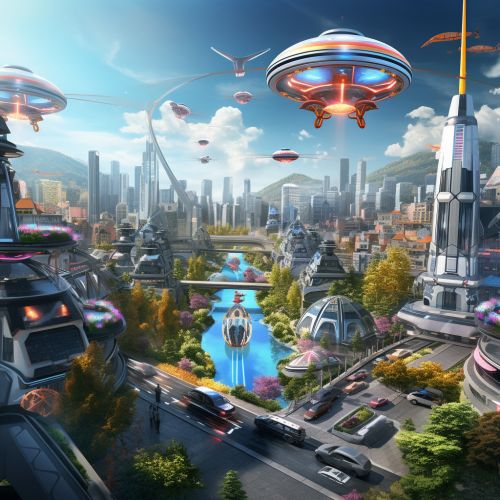Artificial Intelligence (AI)
Introduction
Artificial Intelligence (AI) is a branch of computer science that aims to create machines capable of mimicking human intelligence. This is achieved by creating algorithms and models that allow machines to perform tasks that would normally require human intelligence, such as understanding natural language, recognizing patterns, solving problems, and making decisions.


History and Evolution
The concept of artificial intelligence has been around for centuries, with ancient myths and stories often depicting machines or artifacts with human-like intelligence. However, the modern field of AI wasn't formally established until the mid-20th century. The term "artificial intelligence" was first coined in 1956 by John McCarthy at the Dartmouth conference, where the discipline of AI was born.
Over the decades, AI has evolved from simple rule-based systems to complex machine learning models. Early AI systems were based on symbolic logic and expert systems, where knowledge was explicitly programmed into the machine. However, these systems were limited in their ability to handle complex, real-world situations.
In the 1980s and 1990s, the focus shifted towards machine learning, where systems could learn from data and improve their performance over time. This was a significant breakthrough, as it allowed machines to handle more complex tasks and adapt to new situations.
In the 21st century, the advent of deep learning, a subset of machine learning, has led to further advancements in AI. Deep learning models, inspired by the structure and function of the human brain, are capable of processing large amounts of data and recognizing complex patterns. This has led to significant improvements in fields such as image and speech recognition, natural language processing, and autonomous vehicles.
Types of Artificial Intelligence
Artificial Intelligence can be classified into two main types: Narrow AI and General AI.
Narrow AI, also known as Weak AI, is designed to perform a specific task, such as voice recognition or driving a car. Most of the AI systems we interact with today, from virtual assistants like Siri and Alexa to recommendation systems on Netflix and Amazon, are examples of Narrow AI.
General AI, also known as Strong AI, refers to systems that possess the ability to perform any intellectual task that a human being can do. They can understand, learn, adapt, and implement knowledge in a way that is indistinguishable from human intelligence. However, despite significant advancements in the field, General AI remains largely theoretical, with no existing systems capable of demonstrating this level of intelligence.
Applications of Artificial Intelligence
Artificial Intelligence has a wide range of applications across various industries. In healthcare, AI is used for disease diagnosis, drug discovery, and patient care. In finance, AI is used for fraud detection, algorithmic trading, and customer service. In transportation, AI is used in autonomous vehicles and traffic management systems.
In addition to these, AI is also used in areas such as education, where it can personalize learning experiences; agriculture, where it can predict crop yields and optimize farming practices; and entertainment, where it can create personalized content recommendations.
Ethical Considerations
As AI continues to evolve and permeate various aspects of our lives, it raises several ethical and societal concerns. These include issues related to privacy, bias, job displacement, and the potential misuse of AI technology.
Privacy concerns arise as AI systems often require large amounts of personal data to function effectively. This data, if not properly protected, can be misused or exploited.
Bias in AI systems is another major concern. If the data used to train these systems is biased, the AI systems themselves can perpetuate or even amplify these biases. This can lead to unfair outcomes in areas such as hiring, lending, and law enforcement.
AI also has the potential to displace jobs, as machines become capable of performing tasks traditionally done by humans. While AI can also create new jobs, there is concern about the societal impact of job displacement, particularly for those in low-skilled jobs.
Finally, there is the potential misuse of AI technology. This includes the use of AI in autonomous weapons, deepfakes, and other forms of manipulation or deception.
Future of Artificial Intelligence
The future of AI holds immense potential. With advancements in machine learning and computational power, AI systems are becoming increasingly capable and versatile. However, as AI continues to evolve, it is crucial to address the ethical and societal issues it raises. This will require a collaborative effort from researchers, policymakers, and society at large.


